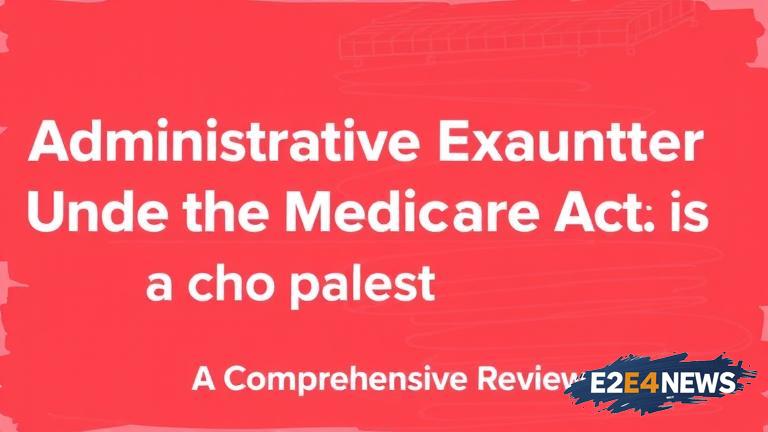The Medicare Act, a federal law that provides health insurance coverage to individuals 65 and older, as well as certain younger people with disabilities, has a complex administrative process for resolving disputes. One key aspect of this process is the requirement of administrative exhaustion, which mandates that parties exhaust all administrative remedies before seeking judicial review. Recently, there have been several court cases that have addressed the issue of administrative exhaustion under the Medicare Act, with varying outcomes. In one notable case, the court ruled that a healthcare provider had failed to exhaust its administrative remedies, and therefore, its claim was dismissed. However, in another case, the court found that the provider had satisfied the administrative exhaustion requirement, and its claim could proceed. These cases highlight the importance of understanding the administrative exhaustion requirement and ensuring that all necessary steps are taken before seeking judicial review. The Medicare Act’s administrative process can be lengthy and complex, involving multiple levels of review and appeal. Parties must navigate this process carefully to avoid having their claims dismissed for failure to exhaust administrative remedies. The administrative exhaustion requirement is designed to ensure that all administrative avenues are explored before seeking judicial intervention. This requirement can be beneficial in resolving disputes efficiently and effectively, but it can also be frustrating for parties who feel that the administrative process is slow or unfair. Despite the challenges, it is essential for healthcare providers and insurers to understand the administrative exhaustion requirement and to take all necessary steps to comply with it. Failure to do so can result in significant delays and costs, as well as the potential loss of claims. In addition to the administrative exhaustion requirement, the Medicare Act also has other provisions that can impact healthcare providers and insurers. For example, the Act requires that healthcare providers submit claims for reimbursement within a certain timeframe, and that insurers process these claims in a timely manner. The Act also has provisions related to coverage and payment for various medical services and procedures. Understanding these provisions is crucial for healthcare providers and insurers to ensure compliance with the Medicare Act and to avoid potential penalties or sanctions. The Medicare Act is a federal law, and as such, it is governed by federal regulations and guidelines. The Centers for Medicare and Medicaid Services (CMS) is responsible for administering the Medicare program and ensuring compliance with the Act. CMS has issued various regulations and guidelines to implement the Medicare Act, including those related to administrative exhaustion. These regulations and guidelines can be complex and subject to change, making it essential for healthcare providers and insurers to stay up-to-date on the latest developments. In conclusion, the administrative exhaustion requirement under the Medicare Act is a critical aspect of the law that healthcare providers and insurers must understand and comply with. By navigating the administrative process carefully and taking all necessary steps to exhaust administrative remedies, parties can avoid potential delays and costs, and ensure that their claims are resolved efficiently and effectively. The Medicare Act’s provisions related to coverage, payment, and reimbursement are also essential for healthcare providers and insurers to understand, as they can impact the provision of medical services and the financial stability of healthcare organizations. As the healthcare landscape continues to evolve, it is likely that the Medicare Act and its administrative exhaustion requirement will remain a topic of discussion and debate. Healthcare providers and insurers must stay informed about the latest developments and changes to the law to ensure compliance and to avoid potential penalties or sanctions. Furthermore, the administrative exhaustion requirement can have significant implications for healthcare providers and insurers, particularly in cases where claims are denied or delayed. In such cases, parties must carefully review the administrative record and ensure that all necessary steps are taken to exhaust administrative remedies. This can involve filing appeals and requests for reconsideration, as well as seeking review by the CMS or other regulatory agencies. By taking a proactive and informed approach to administrative exhaustion, healthcare providers and insurers can minimize the risk of delays and costs, and ensure that their claims are resolved in a timely and efficient manner. Additionally, the administrative exhaustion requirement can also impact the relationship between healthcare providers and insurers, as well as the provision of medical services to patients. In cases where claims are denied or delayed, patients may be left without necessary medical care or treatment, highlighting the need for efficient and effective administrative processes. Overall, the administrative exhaustion requirement under the Medicare Act is a complex and critical aspect of the law that requires careful attention and compliance from healthcare providers and insurers.
